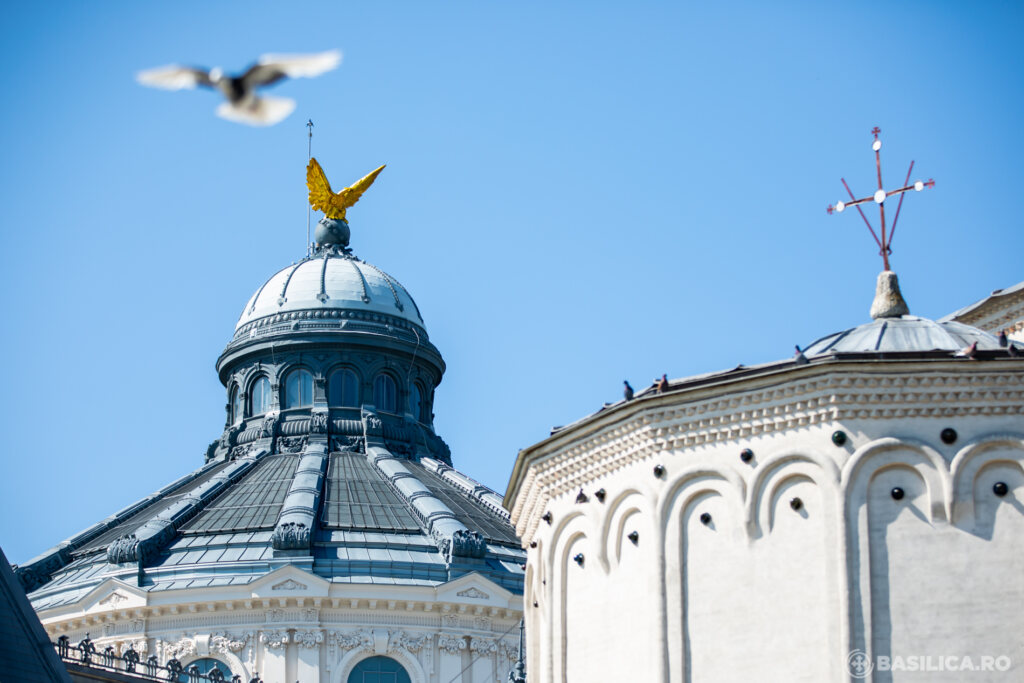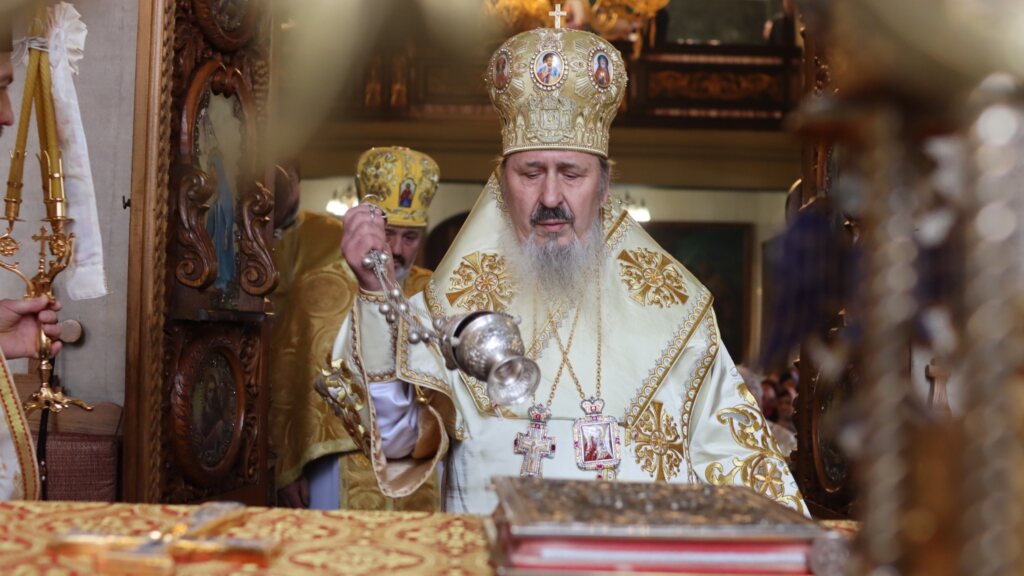During a ceremony on New Year’s Day at the Patriarchal Cathedral in Bucharest when 2023 was officially proclaimed as Solemn Year of the pastoral care of the elderly and Commemorative Year of hymnographers and church chanters, His Beatitude Patriarch Daniel addressed the faithful, stressing that a community’s social maturity can be evaluated by the way people treat their seniors.
Please find below Patriarch Daniel’s address.
Revering and helping the elderly are expressions of spiritual and social maturity in community life
The Holy Synod of the Romanian Orthodox Church declared 2023 as a Solemn Year of the pastoral care of the elderly and a Commemorative Year of hymnographers and church chanters.
The care for the elderly, children and the poor shows the degree of civilization and the depth of Christian living of a people. From this perspective, we are particularly worried about the prevalent societal neglect and indifference towards the elderly (parents and grandparents) in contemporary society.
The traditional human community has always been interested in old people, considering them not a burden but a source of blessing and wisdom, also of merciful love, through their participation in educating children and young people.
Thus, Holy Scripture tells us about the Jewish community’s respect for the elderly. In the Old Testament, respect for the elderly was transformed into a commandment that everyone had the duty to fulfil: “Honour your father and your mother” (Exodus 20:12) or “Stand up in the presence of the aged, show respect for the elderly and revere your God. I am the Lord” (Leviticus 19:32).
He who did not respect his elderly parents was seen as a blasphemer: “If you forsake your father, you are no better than one who blasphemes, and if you anger your mother, you will be accursed by the Lord” (Sirach 3:16, NCB).
The New Testament clearly shows us that the wisdom of the elderly depends on their closeness to God through prayer and their virtuous life.
Thus, the Righteous Simeon was not only a learned man but also constantly praying, enlightened by the Holy Spirit to recognise the Messiah in the Infant Jesus: “Now there was a man in Jerusalem called Simeon, who was righteous and devout. He was waiting for the consolation of Israel, and the Holy Spirit was on him” (Luke 2:25).
The Righteous Simeon was able to carry in his arms the Word of God who became man and present Him as “a light for revelation to the Gentiles, and the glory of your people Israel” (Luke 2:32).
In this sense, we understand why the Righteous Simeon becomes a model and protector of the elderly: he was learned, righteous, God-fearing, patient, and full of faith and hope.
Old age’s physical frailty is concealed by the power of wisdom, the riches of knowledge, and the beauty of gentleness and love.
In this sense, St. John Chrysostom notes: “The weakness of the body does not in any way harm the strength of faith. An adornment of the Church is the hunchbacked gray hair united with the winged faith. The Church particularly rejoices in it.” (PG: L, 737)
Old age must also be understood as the age at which we approach the end of our earthly journey when the Lord Jesus Christ leads us to the house of the heavenly Father (John 14:2).
Unfortunately, today, many older people live in deep loneliness and isolation from the community, feeling somehow useless or, moreover, traumatized by their own ageing. They even reach despair.
That is why the Church is called to think of new forms and up-to-date pastoral methods, getting closer to the needs and expectations of the elderly. At the same time, work must also be done on raising and educating young people not to marginalize the elderly, not to abandon them and isolate them in social assistance centres, because young people and elderly people need each other.
More precisely, seniors need comfort and a word of encouragement, and the young need the wisdom, patience and prayer power of the elderly.
Through their spiritual maturity, the elderly can consistently help to preserve Christian values in our culture for the harmony of society and the family.
Therefore, the Church will help the elderly overcome their lack of confidence, sadness and isolation, which prevent them from participating actively and with hope in the community’s life.
Of course, in addition to the pastoral care of the elderly, the Romanian Orthodox Church already makes significant efforts to help the elderly through various social centres, philanthropical actions and programs.
Currently, 21 daycare centres, 54 residential settlements and 52 home care services operate at the level of the Romanian Patriarchate, all intended for the elderly.
Also, the Holy Synod of the Romanian Orthodox Church proclaimed the year 2023 as a Commemorative Year of hymnographers and church chanters.
While 2022 was dedicated to prayer and hesychasm as a spiritual work of preaching the unceasing prayer of the mind and heart, this year, 2023, we look at prayer, accompanied or supported by church chanting, psalmody itself becoming community prayer.
This has its origins in the Psalms of the Old Testament, as one of the great Church hymnographers Saint Andrew of Crete says: “David once composed a hymn, setting forth, as in an icon, all the evils he had done.”
The hymns contained in the liturgical books of our Church are the creations of hymnographers inspired by the Holy Spirit and help us understand the scriptural text as part of the Holy Tradition.
The texts of the hymns that are chanted in the services of the Orthodox Church deepen and explain the theological richness of the Word of God. Church music is the Gospel sung.
Father Dumitru Stăniloae said in this sense about hymnographic language: “God is so great that only poetry can try to express Him.”
The theological and spiritual depth of the liturgical texts is given by their permanent watering from the Holy Scriptures and from the writings of the Holy Fathers of the Church, who meditated long and deeply on the Word of God.
Theology expressed in the church hymnography is one of the richest in meaning and, at the same time, enlightening for the believers of our Church. Therefore it must be used more in the sermons and catechesis of our days.
Hymnographers such as Saint Romanos the Melodist, Saint John of Damascus, Saint Andrew of Crete, Saint Cosmas of Maiuma, Theophanes the Confessor and Joseph the Hymnographer, Kassiani and others are composers of church hymns of great beauty as regards their form, but also of great theological depth.
Liturgical hymns have been sung on the territory of our country since the beginning of Christianity, and great teachers and composers taught the art or craft of chanting both in princely schools, such as St Sava school in Bucharest or monastic schools, as the former school at Putna Monastery.
We cannot overlook the chanters or the composers of the liturgical hymns of our Church, who were not simple composers or performers, but actual creators of culture and national language, such as Filothei Sin Agăi Jipei, Hieromonk Makarije, Anton Pann, Ștefanache Popescu, Ioan Popescu-Pasărea and others.
The Commemorative Year of hymnographers and church chanters thus becomes an occasion to commemorate those who laboured through their God-inspired work to compose church hymns and interpret them for our advancement in the knowledge of God.
The Solemn Year of the pastoral care of the elderly urges us to multiply our activities to help grandparents, offering them concrete support as a sign of revering them and of communion between generations, between young people and parents or between grandchildren and grandparents.
† Daniel
Patriarch of the Romanian Orthodox Church
Photography courtesy of Basilica.ro / Mircea Florescu
Follow us on Twitter: @BasilicaNews






